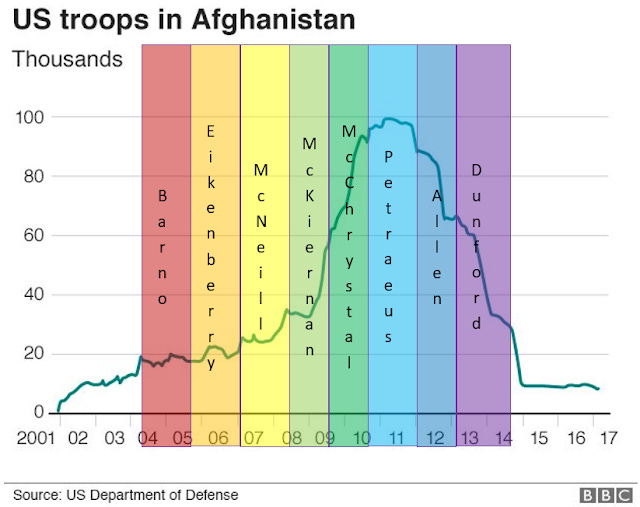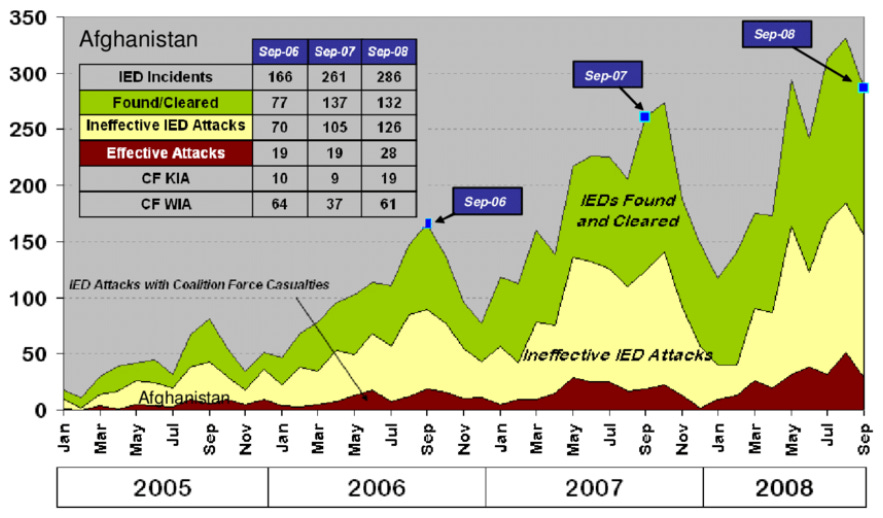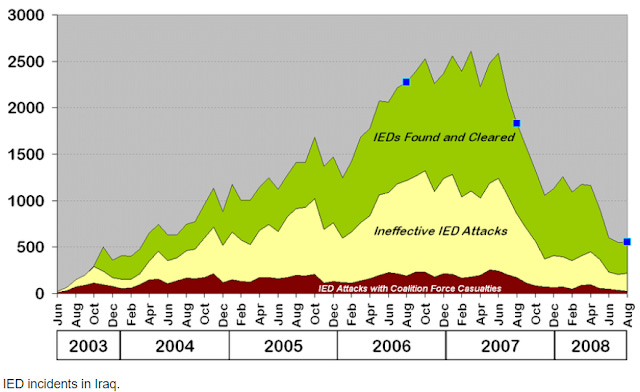Preliminary Commander's POSTEX on Afghanistan
listen carefully
CNN’s summary of Sunday’s 2-hr documentary on Afghanistan has some interesting quotes from the commanders – and a few errors – I thought we should start the week out with.
What is most interesting here are three individuals speaking out who have mostly stayed in the background: Barno, McNeill, and McKiernan. You’ll come away wanting to hear more from them.
No longer in uniform, Gens. Stanley McChrystal, David Petraeus, Joseph Dunford, John Allen, David McKiernan, Dan McNeill, and Lt. Gens. Eikenberry and David Barno, speak frankly.
First, as always – let’s pull out the appropriate graphic. Time and context matters. In the article, they don’t do like they should and go chronologically, so I will here.
Let’s get to the pull quotes:
"I personally resented the war in Iraq," Barno, the senior US commander in Afghanistan for 19 months over 2003 to 2005, says.
Fair, but this is all in hindsight. That feeling is just 20-yrs of running the play over and over. If you read what was being done from Bonn, Brussels, and DC on AFG, what AFG was to become was not seen by most of the decision makers – heck almost all the decision makers. It was more than IRQ, and the contemporary historical record is helpful to review here. In hindsight, he is not wrong – but time travel is not possible.
"The 20-year war in Afghanistan was -- for the results that we have achieved -- not worth the cost," Karl Eikenberry, both a commander in Afghanistan from 2005 to 2007 and ambassador to the country from 2009 to 2011, tells CNN's Jake Tapper in a two-hour documentary that airs Sunday.
...
Eikenberry observes, "There really was no clear political end state. That leads to deep questions. Was it worth it? What was it all about?"
...
"We could provide advice," Eikenberry says. "We could provide training support. But we couldn't give that Afghan army a soul. Only the political leadership and people of Afghanistan could do that. And that was a failure. The Afghan government remained extraordinarily corrupt."
Eikenberry was part of the early, smaller efforts and then came in again later as a civilian with the Obama administration when there was a hard pivot away from a long-term plan to try to get a win. He was there when the march towards defeat began when we culminated at Obama’s DEC 09 West Point speech. He has two perspectives that he seems to be trying to work through internally.
Eikenberry is an almost tragic character. He knows he owns a lot of the blame – as every officer who served in AFG does – and appears to try to explain things as best as he can. His latest comments on Biden’s withdraw are another example.
"My first impulse is to say, yes, it was worth it, but I no longer am certain of that," retired four-star general McNeill, who led coalition forces in Afghanistan from 2002 to 2003 and then US troops from 2007 to 2008, says. "Before I go to my grave, I hope to have that question answered."
...
McNeill, the commander Bush didn't know in 2002, recalls meeting the President at the White House in 2007, during his second tour as a commander in Afghanistan. "'Tell me exactly what you need'," McNeill remembers Bush saying, before adding a caveat: " 'You're not going to get it, because I got to take care of this Iraq thing'."
...
McNeill is introspective. "I am doing soul searching to determine -- is it fair to say I did my share of the task?" he asks. "Did I come up short in some way? What's the duty owed to those who came home, not carrying their shields, but on their shields?"
When asked what he would say to Gold Star families or veterans who wonder if the sacrifices of Afghanistan were worth it, McNeill speaks about his pride in everyone who stepped up to fight there or in Iraq before continuing.
"I would just simply say that for what I have failed to do, I'm sorry," McNeill says. "I did the best I could."
Tapper asks why he blames himself.
"The commander is responsible for what his unit does or fails to do," McNeill answers. "If this is a failure, then I carry my share of it."
McNeill, along with McKiernan, is one of the commanders I have the most direct knowledge of. Our time and place in the AFG conflict mostly overlap, so our perspectives – one a General Officer one a Field Grade staff weenie – are similar from our relative positions. His comments are the best of all here and the ones that resonate best with me.
I need to make a few comments on this McKiernan paragraph that I think contains some commentary from the authors and are not in line with McKiernan. I briefed this issue for months.
McKiernan recalls that in the summer of 2009, troops in Afghanistan were facing a terrible problem with improvised explosive devices. They had three "route clearance companies" to clear roads. Iraq, which faced far fewer issues with IEDs and mines at the time, had some 90 route clearance companies. That didn't change for eight years, until President Barack Obama ordered a surge in troops.
IED came in to AFG from the lessons learned by our enemy in IRQ. The problem manifested itself in IRQ first and then started to decline in 2007. Even at the peak fighting season in 2007 AFG, the IED attacks in IRQ were 10-times higher in IRQ than they were in AFG. The IRQ commander was very jealous of his assets – as he was with his ISR assets, through 2008 in case he needed them.
See these two graphs. They help.
"What happens in that eight years?" McKiernan asks. "You have a Taliban, which has generally a safe haven in the frontier provinces and the Federally Administered Tribal Areas in Pakistan. They become resurgent. And eight years, we don't grow fast enough and well enough [the] capabilities of the government in Afghanistan and the army. And there you are."
...
McKiernan wonders aloud whether there were better ways to retaliate for September 11. He concludes that, there are "probably lots of things we could have done differently."
Remember at the start of the AFG conflict when everyone said that to avoid a problem like Vietnam we had to deny a safe haven? Well, we let Pakistan give them a safe haven. There is a direct line from there to 2021. Department of State, call your office.
The next two players are, in my opinion, the worst of the bunch; McChrystal and Petraeus;
"We didn't understand the problem," says McChrystal, who led international forces from 2009 to 2010. "The complexities of the environment, I think, weren't appreciated. We went for what we thought would work quickly over what would have likely worked over the longer term."
McChrystal argues that in hindsight, right after the September 11, 2001, attacks that triggered the invasion of Afghanistan, the US should have held its fire -- "no bombing, no strikes" -- though he acknowledges that would have been almost impossible. Instead, he would have spent a year building a coalition to counter al Qaeda and training Americans in Arabic, Pashto, Urdu and Dari languages "to get ourselves ready to do something that we knew would be very, very difficult."
McChrystal points out that no one was thinking in the long term, either. "I don't think we sat around a table, ever, and talked about where's this going to be in 20 years."
That is one of the most disingenuous comments about the AFG conflict by any General or Flag Officer. It is, in a word, bullshit. All we did – at least on the planning level – was talk about the long-term project this was. In 2008-09 in Kabul, that was the entire foundation of the Operational Plan.
As for his, “take a year” COA – I’m sorry, I was in theater at the start in 2001. In none of an infinity of parallel universes would that ever been thought of, briefed, or accepted. What a bullshit comment. I don’t need to say more, it mocks itself by its own existence.
Petraeus argues that counterinsurgency -- a strategy he co-wrote a book about -- worked. "It actually did work during the period that we had the resources to do that," he says. McKiernan disagrees. "I think in rural Afghanistan, which is most of Afghanistan, it has not worked," he says.
In general, it is best to ignore Petraeus and listen to McKiernan. ‘Nuff said.
"Much of our strategic attention and much of our strategic capacity was diverted into Iraq, to the detriment of the war," Allen says.
This is true in a variety of ways. Not fully appreciated at the time, but unquestionably true.
Dunford says he believes the US accomplished its mission "to prevent al Qaeda from attacking the United States, to prevent Afghanistan from being a sanctuary and also mitigate the risk of mass migration."
He adds, however, "We shouldn't confuse the outcome with saying that we did that at an appropriate level of investment." He would have liked to see "fewer young men and women having lost their lives, families suffering, casualties, there's no question about it. But at the end of the day, I'm not willing to say it wasn't worth it."
In the short term, yes. I am of the school that things are much more dangerous now than they were 20-yrs ago. That is what we should plan around today. If not, we’ll be luck. If so, we’ll be ready.
Go back and read McNeill’s comments. They resonate best of all, I think.
I’d also offer that you look back at the short video I posted last month with quotes from the commanders of the AFG war. This was, for most of its effort, a NATO effort until they culminated in 2007 and it shifted over to mostly a USA effort from there.
That is one of the problems with this documentary that was also a problem during the AFG conflict. Too many Americans, from Main Street to the Joint Staff, never understood the international effort that was AFG for the first decade of the conflict.
Another error is the mistelling of the “Obama surge.” Review my contemporary writings from 2008-09 on the topic. What we called at the time the “uplift of forces” (to avoid confusion with the IRQ surge that took place earlier), began in 2008 with its first phase done before Obama became CINC. He just approved the next phase. The “Obama surge” was really a Bush-Obama surge. They both were involved. Seems like a small point, but it is an important historical fact that cannot be allowed to become forgotten.





"I don't think we sat around a table, ever, and talked about where's this going to be in 20 years."
This is usually taken to be a critique of our ability to plan strategically long term. But I think it misses the reality mark. What really causes this is our short term deployments. Staffs go over for a year, and they basically go thru a series of ground hog days until they turn over the reins to the next group. The entire effort is usually directed toward getting through the day, then the week and month. It's just a matter of ticking off the days on the calendar, and then you get to turn over and leave. Add to that the number of reserve members who understandably have a short term viewpoint, and the situation is exacerbated.
If you want to win, you need to keep at least the management/leadership staff intact. Imagine if Ike had been replaced by someone else every year. It's no way to run a railroad, and especially no way to run a war that needs long term strategic thinking.
1. There was no strategy gong in. I am no McCrystal fan but he is closer to the crux than any of the others. We had no strategy going in and, once it became clear that tactical success could be achieved, the big units rolled in so the commanders could get their combat tour--that was the objective more than anything else.
Would a BCT commander patiently let the ANA try to conduct an mission or would the BCT make the US forces the center of the action to ensure success and competitiveness for that first star? Our leaders mostly placed getting promoted ahead of success in Afghanistan. A lesson Lawrence of Arabia taught about a hundred years ago but he was all about making the indig successful within their limitations and environment, not about making himself successful within the British Army.
2. The Services were unwilling to do Security Force Assistance. The preparation and employment of forces in Afghanistan reflects that completely. We did a crap job of training the ANA (not is all cases but in the main) because we insisted on teaching them the USA way mostly in English. Two huge mistakes. Most third world countries are not ready for NCOs and LTs making big decisions, they don't function on our timelines, and they don't speak English. Our utter reliance on interpreters, many of whom were not qualified in English or the target language, was shameful. The Army sending, for example, artillery batteries minus the guns in lieu of infantry companies with little or no conversion training or augmentation to bring them up to infantry company strength and equipment was scandalous but common.
3. The Afghans had no soul? Really!? Easy to say as an American who did not fight in the American Revolution, who did not face any risk to family or property. Tens of thousands of Afghans gave their lives. When POTUS abruptly pulled the plug, Afghanistan was not yet ready to stand on its own and Afghanistan was not ready to make good the pay checks. No surprise the ANA folded.